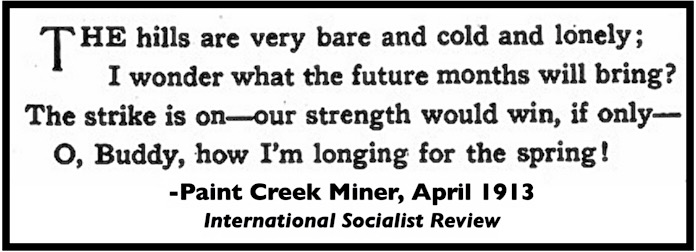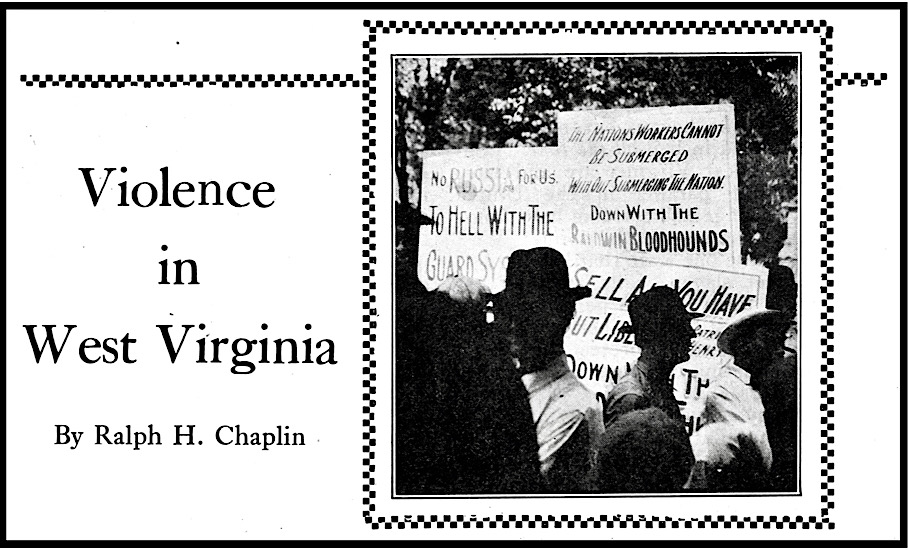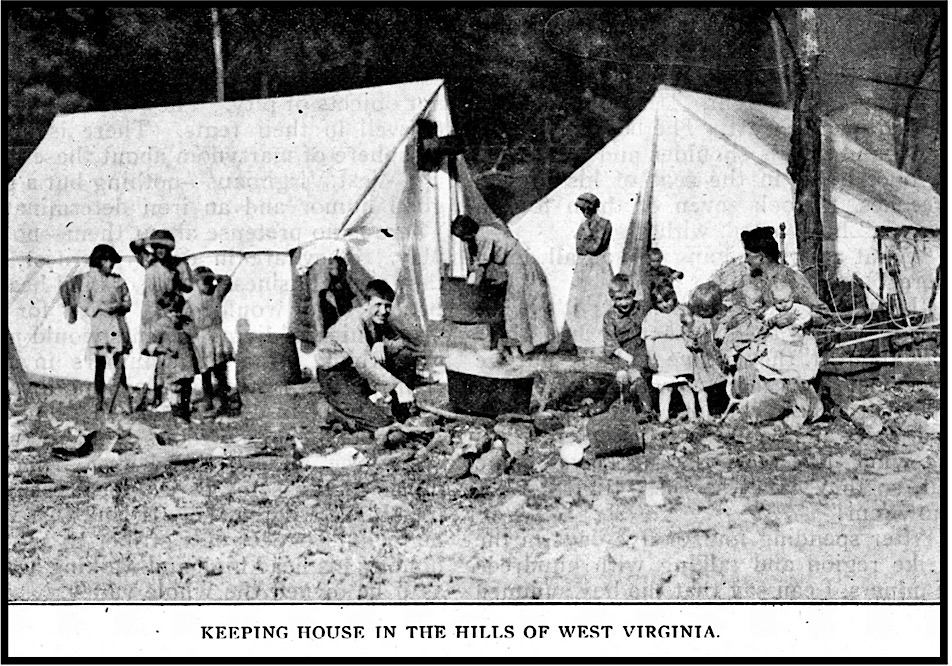 —————
—————
Hellraisers Journal – Tuesday April 1, 1913
Ralph Chaplin on Striking Miners and Military Despotism in West Virginia
From the International Socialist Review of April 1913:
[Part I of III.]
“THEY got my gun when they run me out of the creek, but I done borried my buddy’s, and I’m goin’ back.” This is what a slender, grimy lad of sixteen told me one night in the freight yards of a town not far from the martial law zone. He was picking coal for his mother and sisters at “home” in the tent. His father was in the bull-pen at Pratt. The boy had a bullet wound on his shoulder and numerous bayonet holes in the seat of his ragged breeches. “Took seven of them to run me out,” he boasted, with a grin.
“What are they doing to you all down there?” I asked.
“It isn’t what they’re doin’; it’s what they’re trying to do. If they had their way about it, they’d give us hell-but we won’t let ’em. It’s a whole lot better living in a tent than in a company shack, and we’re just goin’ to stick there until we win. Just wait till the leaves come out, so they cain’t see us. Buddy, we’ll show ’em!”
After spending four or five days in the strike region and talking with hundreds of miners, I can say that the boy summed up the entire situation in his few words. The strikers have “kicked over the traces” and have made up their minds to win at all costs. They are determined to do this all by themselves, if necessary-and in their own way.
In spite of the “heart throb” articles in some of the daily papers, these people are not objects of pity. They are doing pretty well in their tents. There is no atmosphere of martyrdom about these fighting West Virginians-nothing but a grim good humor and an iron determination. There is no pretense about them-no display. They are in deadly earnest, and they mean business. Lots of kind-hearted people who would shed tears for the “poor miners” living in tents would probably think these same miners in their right places if they were picking away at a coal bank in some black pit. The fact that many of the strikers seem to rather enjoy the situation and rest from the mines makes some of the local respectables furious with rage. It isn’t just what one would expect of a striker to see him holding his head high and walking around as if he owned the whole valley.
Of course, there are sufferings and hardships. Many men wear mourning on their hats and many women have husbands, brothers or fathers in the bullpens-but they are going to win this strike; they are sure of it, and this fact makes them feel equal to anything.
It is true that they have tasted of hell since the strike began, but before that time they lived in hell all the time. Conditions in West Virginia are and have been without parallel in the United States. Peonage and serfdom have flourished under the most brutal forms. West Virginia is the one state that has tried to make abject slaves of its miners-that has herded them in peon pens without a vestige of “constitution” liberty, with cut-throat mine guards to protect them from the contaminating influence of organizers and agitators.
For many years the grisly vampire of Greed has fluttered its condor wings and fattened on the very heart’s blood of these men-helpless for want of effective organization. Miners are working in company towns who seldom see money-nothing but paper script-men who dare not speak a word of criticism of the intolerable conditions under which they labor, or even hint that organization is desirable. The blacklist and the brutal mine guards are every ready to punish such indiscretions.
Women have been beaten on the breasts and kicked into convulsions while in a state of pregnancy-men have been shot up and man-handled, all because they had dared to raise their voices in protest. Indignity after indignity has been heaped upon the workers in the hell-holes of this state, until they have united into one big Brotherhood of Revolt. They are standing shoulder to shoulder with the only weapons available in their hands, fighting to overthrow the dismal industrial despotism that is crushing them. These miners are remarkable in many ways. In spite of all they have endured, their spirits have not been broken. They have been hoarding their hate for many years and biding their time. At present they are waiting for the leaves to come out.
Types of Americans are to be found in the Kanawha valley that have been extinct in other parts of this country for years-the types that still cherish the instinct of self-reliance and independence which characterized the frontiersman of a couple of generations ago. Each one of these miners was raised with a rifle and is at home on the hillsides. Solidarity is something more than a word in Kanawha county; it is a tremendous and spontaneous force-a force born in the hot heart of the class struggle. As yet the tactics of modern industrial warfare are a closed book to these men, but they are learning fast.
Kanawha county showed the largest gain on record in Socialist votes during the last election. When the powers that be nullified any benefits the miners might derive in this way, by means of martial law-well, they just returned to their rifles. And when the officials of the United Mine Workers tied their organization up with a thousand clumsy contracts-each contract as heavy to drag along as a ball and chain-so that they could not strike in sympathy with their brothers-well, they just returned to their rifles. They are excellent shots, absolutely fearless, and as staunch and determined a bunch of fighters as ever learned through bitter experience the need of class brotherhood. When they once learn the supreme lesson of unity on the job and in the strike, these men will be a tough proposition for the bosses to face.
The class struggle means something to West Virginia miners. They are using violence only because no better weapons are handy. Gladly would they go out on strike, in every part of the state, if the union “officials,” with their sacred contracts, would permit of it. If there is anyone more to blame for this violence than the blind and insatiable coal operator it is the labor faking official who has tied the miners’ hands with stupid agreements, leaving no other recourse but the rifle. They would be willing and glad, to the last man, to participate in a state-wide strike, and eventually they will insist upon it, and Germer and his bunch, who are always howling at the fallacy of aught but the pure and simple way, will be swept to one side, while the revolution goes marching on. A strike of all the coal miners would be so much simpler, so much more effective. Violence is the last resort of a divided “organization.” The general strike would enable the workers to fight the bosses without fighting their own class at the same time.
The miners are learning-learning fast. Learning by watching union miners at work-under contract, all around them; union railroad men hauling mine guards and strikebreakers into the strike zone and hauling scab-mined coal out. Some of them cannot forget that it was men with union cards in their pockets who put steel plates on the private war engines of the masters! An armored train was being assembled at the C. & 0. shops here in Huntington a short time ago. It was to be perfectly bullet-proof, in order to insure the safety of such scabs and soldiers as the operators might see fit to pour into the strike zone when occasion required. A hellish contraption it surely was-covered with steel plates, bristling with machine guns and loop-holed for rifles.
The union men at the shops looked at the thing askance, realizing that it was to be used against members of their own class. The machinists shied at it like mules from a white blanket, and so it was up to the boilermakers and the carmen. These were pretty much undecided as to whether they would touch it at all or not, when some Holy Rollers among the latter said they would pray and ask Jesus what they should do. So, they prayed and asked Jesus, and came back with the report that Jesus said it was all right, to go ahead and put on the plates!
[Emphasis and paragraph breaks added.]
~~~~~~~~~~~~~~~~~~~~~~~~~
SOURCE & IMAGES
International Socialist Review
(Chicago, Illinois)
-April 1913, page 729
https://www.marxists.org/history/usa/pubs/isr/v13n10-apr-1913-ISR-riaz-ocr.pdf
See also:
Wobbly
The Rough and Tumble Story of an American Radical
-by Ralph Chaplin
University of Chicago Press, 1948
https://books.google.com/books?id=u6Dzx2p8AoAC
Log in and borrow:
https://archive.org/details/wobblyroughandtu0000chap
Full view:
https://catalog.hathitrust.org/Record/001137040
Chapter 11, page 116: The Kanawha Miners’ Strike
https://babel.hathitrust.org/cgi/pt?id=uc1.31210001076247&view=2up&seq=126
Tag: West Virginia Court Martial of Mother Jones + 48 of 1913
https://weneverforget.org/tag/west-virginia-court-martial-of-mother-jones-48-of-1913/
Tag: Paint Creek-Cabin Creek Strike of 1912-1913
https://weneverforget.org/tag/paint-creek-cabin-creek-strike-of-1912-1913/
Tag: Ralph Chaplin
https://weneverforget.org/tag/ralph-chaplin/
Hellraisers Journal, Tuesday April 17, 1917
International Socialist Review: “A New Revolutionary Song Book”
“When the Leaves Come Out” Announced for Sale
~~~~~~~~~~~~~~~~~~~~~~~~~
Coal Miners Grave – Hazel Dickens


